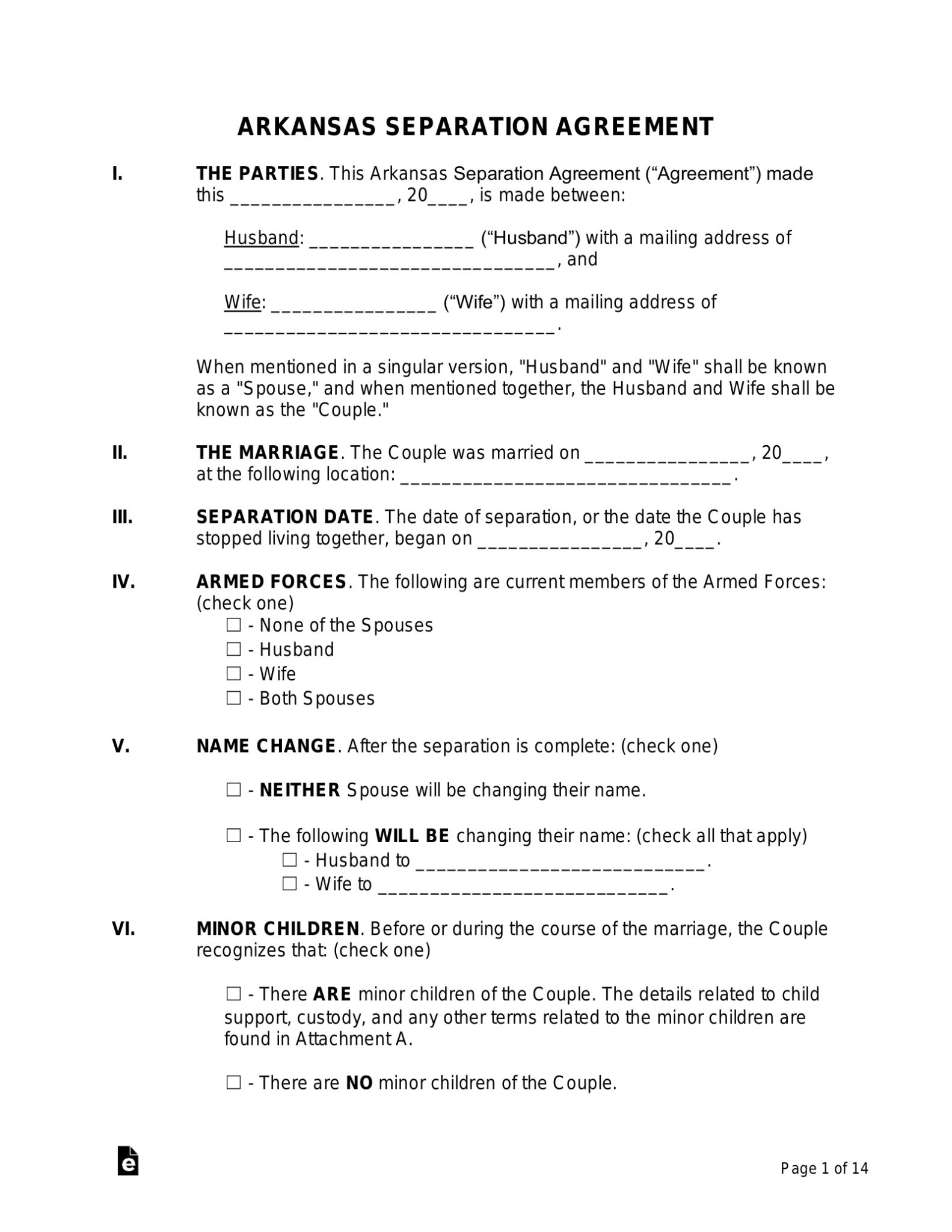Enforcement of Legal Separation Laws in Arkansas
In Arkansas legal separation can be a valuable choice for couples going through a challenging time in their relationship who arent quite ready to get divorced. It lets them live separately while still being legally married. This setup offers a way to address matters like child custody, support and property division without officially ending the marriage.
From what I’ve witnessed people often opt for legal separation instead of divorce even when facing issues in their marriage. This choice is driven by personal beliefs or religious convictions. In Arkansas legal separation provides an opportunity to set the terms of separation giving both parties a clear understanding and a legal structure to uphold their obligations. While the process may initially appear daunting grasping its nuances can significantly impact ensuring fairness and transparency during a difficult period.
Key Differences Between Legal Separation and Divorce

Although legal separation and divorce may appear alike they differ in various aspects. Here are the main distinctions.
- Status: In a legal separation, the couple remains legally married. They are not free to remarry, unlike in a divorce where the marriage is legally terminated.
- Financial and Legal Responsibilities: Both spouses remain responsible for each other’s debts and financial obligations in a legal separation, unlike in a divorce where these responsibilities are typically divided.
- Reconciliation: Legal separation can be a step toward reconciliation. If the couple decides to reconcile, they can do so without going through a new marriage process. Divorce, on the other hand, ends the marriage permanently.
Based on what I’ve seen a lot of folks opt for legal separation to see how things go before fully committing to divorce. Its like a trial period that gives them a glimpse of life apart while still being technically married. This can hold significance, for emotional or financial reasons.
Eligibility Requirements for Legal Separation

To qualify for legal separation in Arkansas, you must fulfill certain criteria.
- Residency: At least one spouse must be a resident of Arkansas for a minimum of 60 days before filing for legal separation.
- Grounds for Separation: Unlike divorce, legal separation in Arkansas does not require grounds or reasons for the separation. The couple simply needs to agree to the separation.
- Mutual Agreement: While it is not mandatory, having a mutual agreement between the spouses can make the process smoother and less contentious.
Looking back at my experiences with clients I’ve realized that grasping the eligibility criteria can really help ease the process. It’s crucial to meet these standards to ensure a seamless legal separation and to clearly define the rights and responsibilities of both parties involved.
Steps to File for Legal Separation in Arkansas
While the process of filing for separation in Arkansas may appear daunting breaking it down into steps can help make it more manageable. Here’s a straightforward guide to assist you in navigating through the procedure:
- Step 1: Gather Necessary Information – Start by collecting all relevant documents, such as financial statements, property deeds, and information regarding children if applicable. This helps in preparing a comprehensive petition.
- Step 2: Draft a Petition – You will need to file a petition for legal separation with the local court. This petition should include details about your marriage, reasons for separation, and any agreements regarding support or property division.
- Step 3: File the Petition – Submit your completed petition to the court. There may be a filing fee involved. It’s essential to check with your local court for the exact amount and payment methods.
- Step 4: Serve the Petition – After filing, you need to serve a copy of the petition to your spouse. This can be done through a process server or by certified mail. Ensure you have proof of service for court records.
- Step 5: Attend the Hearing – The court will schedule a hearing where both parties can present their case. It’s often helpful to have legal representation to ensure your interests are well-represented.
- Step 6: Finalize the Agreement – If the court approves your petition, it will issue a legal separation decree. This document outlines the terms of your separation, including financial and custody arrangements.
Based on what I have seen approach can really help ease tension and uncertainty. Every action is like a piece of a puzzle that comes together to create a complete view of ensuring a fair and orderly breakup.
Legal Implications and Responsibilities
Going through a separation in Arkansas brings along specific responsibilities and consequences. Being aware of these aspects can assist you in managing the process more smoothly.
- Financial Obligations: Even though you are legally separated, both spouses might still be responsible for each other’s debts incurred during the marriage. It’s crucial to have a clear understanding of financial obligations to avoid future disputes.
- Property Division: Legal separation requires the division of marital property. The court will determine how assets and liabilities are split. This is where having a detailed agreement or representation can be very beneficial.
- Child Custody and Support: If children are involved, the court will establish custody arrangements and child support obligations. These decisions are made based on the best interests of the child.
- Legal Status: Remember that while you are legally separated, you remain married in the eyes of the law. This status affects various aspects of life, including taxes and inheritance rights.
I’ve witnessed how clients grapple with these challenges often feeling swamped by the complexities of the law. Tackling these obligations from the outset can help avoid numerous problems later on and offer a more straightforward direction ahead.
Enforcement of Legal Separation Agreements
Upholding a separation agreement is essential to ensure that both parties adhere to the agreed upon terms. Here are some ways to navigate this process effectively.
- Understand the Agreement: Both parties should fully understand the terms of the separation agreement. This includes financial responsibilities, property division, and custody arrangements.
- Maintain Documentation: Keep detailed records of all related transactions and communications. This documentation can be invaluable if disputes arise or if you need to prove compliance with the agreement.
- Seek Legal Assistance: If either party fails to comply with the terms of the agreement, legal action may be necessary. Consulting with a lawyer can help in filing motions or seeking enforcement through the court.
- Regular Review: Periodically review the agreement to ensure it still meets your needs and circumstances. Life changes may necessitate adjustments, and having a legal professional review these changes can be beneficial.
In my own journey I’ve witnessed the importance of upholding these contracts with care. Its not solely about adhering to protocols but also about ensuring equity and finding solace amidst a difficult period.
Modifying or Terminating Legal Separation
A separation doesn always have to be lasting. Life situations evolve and your needs or preferences may shift too. If you want to change or end a separation it’s important to grasp the procedure involved. This knowledge will help you make choices.
Changing a legal separation usually means adjusting aspects like child custody, support or how assets are divided. Here’s a breakdown of the process.
- File a Motion: Submit a formal request to the court explaining why you need to modify the terms of the separation. This might be due to changes in financial status, job location, or other significant life events.
- Provide Evidence: Present evidence supporting your request. This could include financial records, changes in living conditions, or any other relevant documentation.
- Attend a Hearing: The court will schedule a hearing to review your request. Both parties will have the opportunity to present their case, and the judge will decide whether to approve the modification.
Ending a legal separation is a process. It usually requires submitting a divorce application. However it’s important to make sure that all aspects of the separation agreement have been taken care of before proceeding. This helps ensure that everything is in order and prevents any issues during the divorce proceedings.
From what I’ve seen clients tend to feel less overwhelmed by the modification process if they take a careful approach. Life is constantly changing and being ready to adjust is crucial for handling a separation smoothly.
Seeking Legal Advice and Representation
Going through a separation can be tricky and it’s usually a good idea to get some help. Lawyers can help make things clearer for you and make sure your rights are safeguarded during the whole process.
Here’s why it’s crucial to seek legal counsel
- Expert Guidance: Lawyers specializing in family law can offer valuable insights into the legal implications of your decisions and help you understand your rights and obligations.
- Drafting Agreements: A lawyer can assist in drafting clear and fair agreements that address all aspects of your separation, from financial arrangements to child custody.
- Representation: If disputes arise or if the case goes to court, having legal representation ensures that your interests are effectively represented and advocated for.
In my experience I’ve seen how a skilled lawyer can help lighten the emotional and legal challenges that come with separation. It’s not solely about dealing with the legal aspects; it’s having someone who gets your individual circumstances and provides personalized guidance.
FAQ
Q: Can I change the terms of my legal separation after it’s finalized?
Absolutely, you have the option to seek changes to the conditions of your legal separation. Usually, this requires submitting a request to the court along with supporting evidence to justify the need for modifications.
Q: How long does a legal separation last?
A: The duration of a separation isn’t fixed. It continues until you either get back together change the terms or move forward with a divorce.
Q: Do I need a lawyer to file for legal separation?
A: While you can technically seek legal separation without an attorney having one can safeguard your rights and facilitate a smoother process.
Q: Can legal separation affect my credit score?
A: When going through a separation it can have an impact on your financial duties and potentially influence your credit rating. Its crucial to handle your responsibilities wisely and monitor your credit history closely.
Q: What happens if my spouse does not comply with the separation agreement?
If your partner fails to adhere to the separation agreement, it might be necessary to seek help from a professional to uphold the conditions or make adjustments to the agreement as needed.
Conclusion
Navigating the process of legal separation in Arkansas can be quite a challenge. However with the right information and assistance many individuals manage to go through it successfully. From submitting the petition to addressing changes and seeking legal counsel every step presents an opportunity to ensure that your needs and those of your family are met, with fairness and empathy. Having observed numerous clients navigate this journey I’ve come to realize the significance of approaching it, with clarity and a readiness to adjust as circumstances evolve. Keep in mind that you’re not alone in this and seeking guidance can greatly impact achieving a resolution that is suitable for all parties involved.


